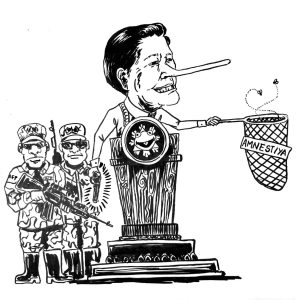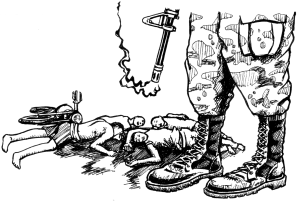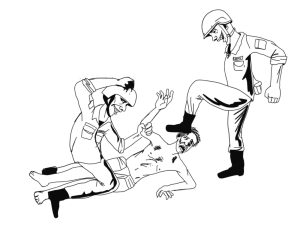AFP: An ever-bloated leech


The Marcos regime is set to allot a whopping ₱170 billion next year for pension funds of the Armed Forces of the Philippines (AFP) and other uniformed personnel of the reactionary state. This shows that declared plans to reform the pension system which has “hemorrhaged” the national budget is all hollow talk.
In fact, the state plans to take ₱120 billion from the its “savings” next year. This is despite widespread opposition to this anomalous system: even without a single contribution to the fund, retired military and police personnel receive massive pensions. It also plans to institutionalize a 3% annual salary increases for uniformed personnel for the next 10 years to “negate” any deduction for pensions.
The AFP pension system is a heavy onus on the Filipino people. In recent years, alloted funds for military pension stood as the second largest item in the national budget. It grew even larger after the Duterte government doubled the salaries of AFP officers and personnel to secure their loyalty. Their average monthly pension is around ₱40,000 which is almost ten times than SSS pension, and almost three times that of the GSIS. (See the article “AFP pensions burden the nation” in Ang Bayan May 21, 2023 issue.)
Apart from the huge pension, the AFP and PNP also eat up a large part of the national budget for salaries, various gratuities and payments to soldiers, and gargantuan expenses for the purchase of equipment. In recent years, the AFP has been overly pampered. This is part of the intensifying militarism of the ruling state and the ruling clique’s attempt to gain the loyalty of AFP generals and personnel.
The 2023 national budget reveals how the AFP, PNP and other uniformed personnel are favored, far more than civilian agencies. Of the total allocation for salaries and other compensation for government employees, 30% goes to military personnel.
Soldiers and police receive extra pay for every action they take. They receive “Combat Duty Pay”, apart from “Combat Incentive Pay”; they receive a “Hazardous Duty Pay”, there is also “Hazard Duty Pay” and “High Risk Duty Pay”. When they board a ship, there is a “Sea Duty Pay”; when tasked to ride a helicopter or plane, they receive a “Flying Pay.” When they jump, there is a “Parachutist’s Pay.” There is also an “Instructor’s Duty Pay” and “Reservist’s Pay.”
For soldiers and police (who retire at age 56), ₱36.427 billion is allocated for “longevity pay”, which is 43 times bigger, than the budget allocated to the “longevity” of all other government personnel (₱842 million).
The 2024 budget requested by the Department of National Defense is higher by 14.16% to ₱232.2 billion. This is while the budget for the departments of labor and employment and for migrant workers was cut by 14% at ₱40.5 billion. It is also greater than the regime’s boasted assistance for 18 million families which is only ₱200 billion.










